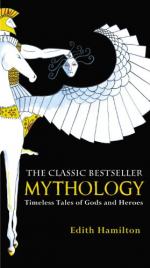|
|
Mythology Part 1, Chapter 4: The Earliest Heroes
When Prometheus was first bound to the rock, a heifer named Io spoke to him like a woman:
"Did you do wrong?
Is this your punishment?
Where am I
Speak to a wretched wanderer.
Enough - I have been tried enough-
My wandering -long wandering,
Yet I have found nowhere
To leave my misery.
I am a girl who speaks to you,
But horns are on my head." Chapter 4, pg. 96
Hera turned her into a heifer because Zeus desired her. Prometheus knew who she was and she knew his story. They exchanged their tales of woe and realized that Zeus was the cause of everything. He is a king of the gods with little wisdom or foresight. He had tried to hide them in a cloud, but Hera saw through this. Hera asked Zeus for the heifer Io as a gift and Zeus could not deny her. Zeus was upset about this and he asked Hermes to free Io from the hundred-eyed creature who was guarding her. Hermes killed the beast and put his eyes on the peacock, which became the beast of Hera. Prometheus assures her that a sea, the Ionian, will be named after her and that she will have a son with Zeus when she is returned to a human being. Her descendant will be Hercules. Bosporus is named so because of the bovine woman.
Europa was the daughter of the King of Sidon. Zeus watched her wake from a troubled dream about two continents that tried to feed on her. Europa stayed awake and went with her companions to the sea. While gathering flowers, they were watched by Zeus, who fell madly in love with her because of Cupid. Zeus turned himself into a beautiful bull and ran away across the sea with Europa when she climbed on his back. Europa guessed that the bull was divine and pleaded for him to release her. They went to Crete and had a wedding. Her sons were Minos and Rhadamnathus, who were just men on earth and judges in the afterlife.
Polyphemus is one of the Cyclopes, and one of the only creatures born before the Titans, who was not killed by the Olympians. They forge Zeus' thunderbolts. They increased in numbers and became fierce and lawless, not fearing the Olympians. Odysseus came to the island of Polyphemus and he and his men took some of his milk and cheese. The cyclops returned from grazing his flock and became enraged. He killed and ate some of the men. Odysseus found a long timber the next day and sharpened it. With the help of some of his men, he blinded the beast. Polyphemus stood in the way of the doorway but Odysseus and his men got out by hanging under the stomachs of the sheep as they left. Polyphemus cursed the man. He changed through the centuries "as what is ugly and evil is apt to change and grow milder with time." Chapter 4, pg. 109. The next story of the Cyclops has him pathetically in love with a sea nymph who wants nothing to do with him. She came around and pelted him and his flock with apples. He sang songs to soften her heart. Later, in another tale, she almost became his because he is a favored son of Poseidon. She fell in love with a prince whom Polyphemus kills in jealousy.
In Greece there are a wide array of wild flowers and along with this, a wide array of flower myths. Their narcissus flower was a purple bloom that Zeus created for Hades. It distracted Persephone from the other flowers. When she reached for it, Hades came for her. A boy named Narcissus was so beautiful that all the nymphs of the forest loved him. One of Artemis' favorites, Echo, was especially smitten with him. Her punishment for speaking so much was that she could only repeat what others said. She could not have a conversation with Narcissus. He saw a reflection of himself in a pool and fell in love. He was cursed to love himself and gazed at his reflection until he died. A flower took the place of his body.
Another flower was the hyacinth, shaped like a lily and deep crimson in color. It came from Hyacinthus, Apollo's companion who was accidentally killed by the god's discus. Apollo was grief stricken and he named the flower that bloomed in his blood after him. These flowers are emblematic of Greek mythology: beauty supported by terrible sacrifice. The most wretched of the flower tales is of Adonis. Aphrodite fell in love with the youth when he was born and took him to Persephone, who also fell in love. They fought over him and Zeus decreed that the boy would spend half the year with the dead and the other half with the living. One year, when he was on a hunt with Aphrodite, a boar gored him and his blood became the anemone.




